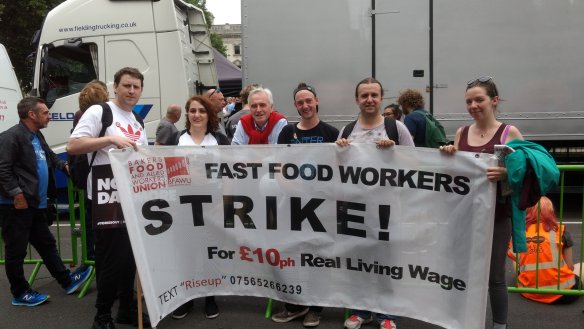
This is a further installment to a long-running blog series on the National Labor Relations Board’s hot and cold relationship with the joint-employer standard, which was first implemented by the Obama Administration’s NLRB. This week’s decision by the Board to vacate and remand an administrative judge’s July 2019 denial of McDonald’s, together with thirty of its Franchisees, and the Trump-appointed current NLRB General Counsel’s’ proposed settlement agreements has had the effect of put-off a ruling on the joint-employer status of McDonald’s, and by extension like-situated Franchisors, for the time-being.
For a refresher on the issue, these are the previous posted articles found here, here and here.
This action began when six complaints were filed by the employees of McDonald’s’ Franchisees in six NLRB regions around the country. In all, thirty Franchisees were alleged to have violated labor laws during their resistance to the “Fight for $15” campaign. These complaints commenced what was to culminate as the largest labor case ever adjudicated by the NLRB, according to its dissenting board member.
The complainants specifically alleged that their employers retaliated against them during the labor campaign by way of terminations, hour reductions, benefit offers, suspensions and early dismissals from shifts. They further alleged that McDonald’s coordinated the resistance to the labor campaign and provided guidance to the Franchisees.
Following three years of litigation, involving 150 days of hearings, the Trump Administration’s General Counsel (who is on record as opposing the joint-employer standard), together with the other parties proposed thirty separate (yet informal) settlement agreements to the hearing judge by way of motion. The Court denied the motion finding that the parties failed to meet the standards set by precedent. In short, the judge found that the settlement agreements were unreasonable and that McDonald’s obligations under the agreements “’do not in any way approximate the remedial effect’ of the joint-employer finding, which the General Counsel had sought to obtain throughout the litigation.” Further, the judge pointed out several structural defects with the settlements.
The parties, however, argued that the settlements remedied every single claim raised by each of the claimants. The terms required the offending Franchisees to remedy their employees’ claims within nine (9) months of the settlement, and further, McDonald’s agreed to collect $250,000.00 in escrow from the Franchisees and pay it over to the Board to ensure that the employee claims were satisfied. The administrative judge stated that these terms and the default process were simply too complicated.
The parties appealed to the Board, which found the settlement terms to be reasonable, to comport with the Board’s policy of dispute resolution and encouraging settlements, and noted that had the parties appealed the administrative court’s ultimate decision, the litigation would have continued for several years more, during which time none of the claimants would have received any remedies, such as back-pay. The judge’s July order was, therefore, vacated, and the court was ordered to implement the settlements.
So, what is the overall impact of this decision? The Trump Administration had issued a proposed rule-making regarding the standard for determining joint-employer status. This rule is still pending. Further, the federal court’s Browning-Ferris decision still stands, in which the joint-employer standard was recognized, albeit modified and narrowed from the original standard set by the previous administration.
Clearly, more on this issue will unfold in the years (and Administrations) to come.
Advice: Franchisors — Consider getting ahead of the next progressive assault on the franchise model by enforcing a common term found in the default boiler-plate language of your Franchise Agreement, which obligates the Franchisee to obey the law. If you, the Franchisor, notice a pattern of labor law violations by your Franchisees, then notice them for breach, and if the violations are flagrant and uncured, then default them. Get unscrupulous Franchisees out of your system. Reasonable oversight by Franchisors does not trigger joint-employer status, but it would promote a more content franchise work-force, and perhaps take the wind out of the progressives’ attempts to re-invigorate the joint-employer standard to the great detriment of the franchise business model. Happy Franchisee employees will ensure a better franchise experience for your ultimate customers, and this will benefit everyone.
For a copy of the NLRB decision, go here.
BE ADVISED that these comments are not intended as legal opinions and are not to be relied upon as legal advice. If you need franchise-related legal advice, please contact us to discuss the specifics of your franchise business.
© KilcommonsLaw, P.C. 2019
